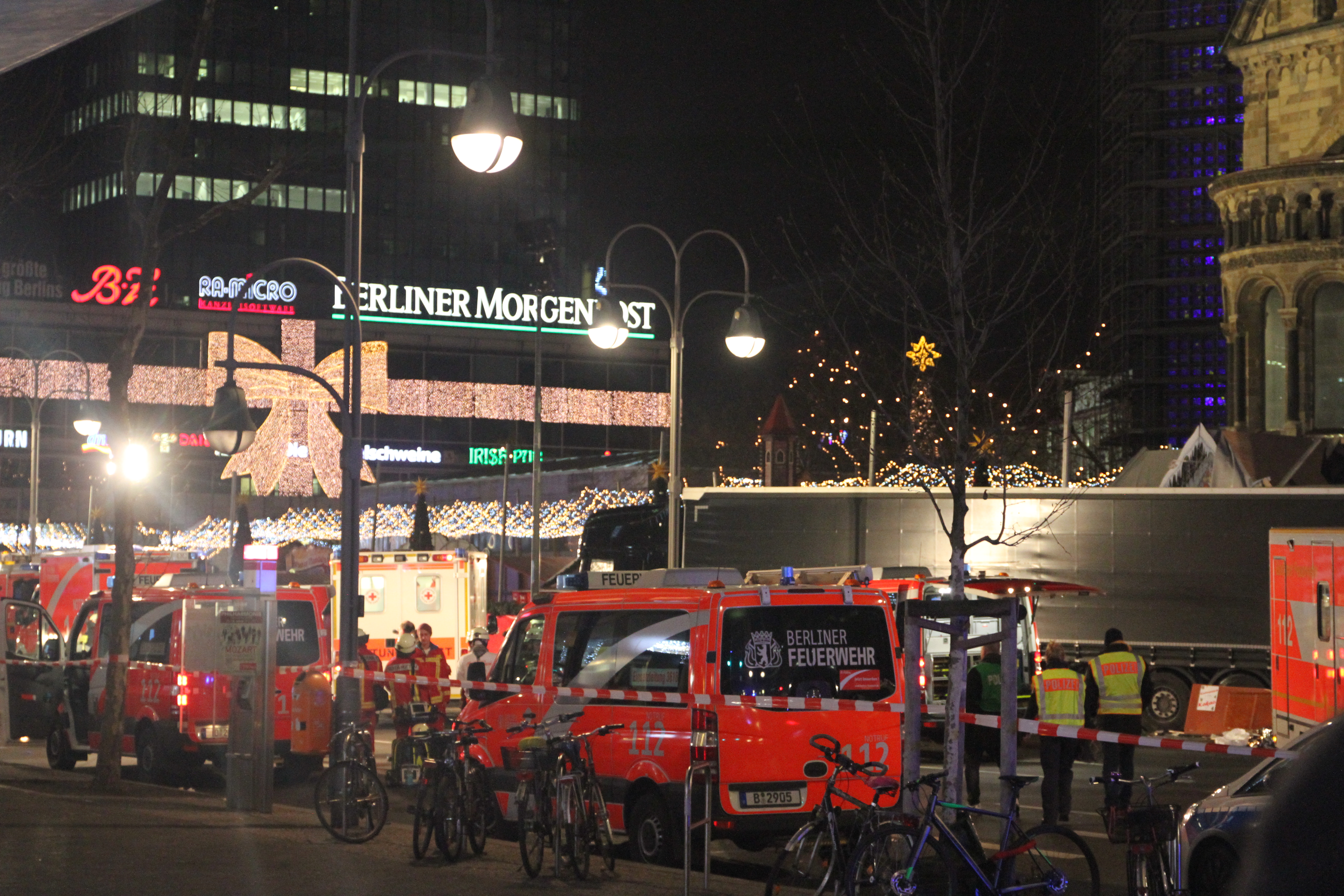Disavowing the attacker
Following the truck attack on a busy Christmas market at Breitscheidplatz in the heart of former West Berlin on December 19, German Muslims have sought to dissociate themselves from the presumed attacker. The suspected jihadist, Anis Amri, remains at large at the time of writing.
Muslims gathered on the square where the attack had occurred, wearing t-shirts with the inscription “Muslims for peace”, and holding up signs such as “I am a Muslim, not a terrorist”.1 A choir, composed of long-standing German residents and recently arrived refugees, came out to sing Christmas songs.2
In the aftermath of the attack, anxieties among refugees are running particularly high: speaking to the Süddeutsche Zeitung newspaper, many express fears about a worsening security situation and a growing incidence of terrorist attacks. They worry about tighter immigration policies and above all about greater suspicion and distrust that couls make building a life in Germany more difficult.3
Responses of Muslim bodies and representatives
Representatives of the country’s largest Muslim associations have strongly condemned the attack and sought to show their presence during official ceremonies of mourning.4 An Imam participated in the oecumenical service at the Kaiser Wilhelm Memorial Church, a war-damaged church at Breitscheidplatz rechristened as a monument to peace. The service was also attended by leading politicians, including Chancellor Merkel.5
At the same time, Muslim associations’ capacities remain circumscribed due to their internal divisions and their limited ability to represent Muslim believers in a convincing fashion. In contrast to a host of Christian and Jewish institutions, they are also not recognised as ‘religious communities’ (Religionsgemeinschaften) or as ‘corporate bodies of public law’ (Körperschaften öffentlichen Rechts) and thus have a distinctly inferior legal status in the country – a fact which hampers their financial and social capacities as well as their political clout.6
The complex politics of Islamic associational life
Consequently, Germany’s Muslim community may struggle to develop a coherent and powerful public response to the Berlin attack. Already in January 2015, when a vigil with a large number of high-ranking participants from politics and society was organised in front of the Brandenburg Gate to commemorate the attack on Charlie Hebdo, bitter infighting broke out among Germany’s disparate Muslim associations.
At the time, representatives of the DİTİB, VIKZ, and IRD umbrella bodies, each of which runs substantial numbers of mosques, had a public fallout with their rival Aiman Mazyek, chairman of the Central Council of Muslims in Germany (ZMD). They accused Mazyek of using the vigil to distinguish himself and to derive political capital for himself and the ZMD to the detriment of the other associations.7
Germany at a crossroads
One might be tempted to hope that in the aftermath of the Breitscheidplatz Christmas market attack – the first substantial jihadist incident on German soil – the country’s Muslim associations could be propelled to overcome some of their long-standing hostilities and move to a more unified position.
Yet it is equally if not more plausible to expect tensions between these antagonistic players to increase in the coming weeks and months. Muslim representatives and institutions seem poised to be sucked into a divisive spiral of politicisation in which they are required to prove their loyalty to the German state.
The onset of this dynamic could already be observed in the immediate aftermath of the attack. Horst Seehofer, leader of the CSU, Bavarian sister party to Angela Merkel’s CDU, swiftly demanded a fundamental recalibration of Germany’s immigration and integration policies.8 A high-ranking AfD politician commented on Twitter that the fatalities of the attack were “Merkel’s dead”, i.e. a consequence of her lax immigration policies.9
Invoking unity
The bulk of the political responses to the events of December 19 has been more measured so far. Berlin’s mayor, Michael Müller (SPD), called upon the three monotheistic religions to continue to live together in peace. He asserted that “Jews, Christians and Muslims belong to this city” and must “not let themselves be pitted against one another”.10
CDU politicians as well as a range of civil society actors harshly criticised Horst Seehofer for his glib calls for repressive measures and his populist ‘law and order’ approach.11
Cautionary tale from the other side of the Rhine
In this respect, the political climate in Germany is still far from attaining the poisonous levels reached in France after the November 2015 terrorist attacks. Yet it is worth remembering that after the January 2015 Charlie Hebdo massacre, France lived through something of a moment of national unity in which millions of citizens and leaders peaceably took to the streets, collectively defying the terrorist challenge.12
Nearly two years and two major attacks later, this sense of unity appears to have dissipated completely. This highlights the challenges that Germany will face in the months and years ahead. The truck assault of December 19 may inspire the sense of cohesion that many observers are hoping for. Yet this cohesion remains fragile and vulnerable to further attacks.
Sources
http://www.spiegel.de/politik/deutschland/anschlag-in-berlin-muslime-demonstrieren-gegen-terror-a-1126876.html ↩
http://www.sueddeutsche.de/politik/anschlag-in-berlin-wir-sind-hier-weil-wir-alle-menschen-sind-1.3305340 ↩
http://www.zeit.de/gesellschaft/zeitgeschehen/2016-12/anschlag-weihnachtsmarkt-berlin-fluechtlinge-reaktionen/komplettansicht ↩
http://www.islamiq.de/2016/12/20/religionsvertreter-verurteilen-berliner-anschlag/ ↩
https://en.qantara.de/content/islam-in-germany-a-poor-second ↩
http://www.fr-online.de/terror/zentralrat-der-muslime-muslime-sauer-auf-mazyek,29500876,29557370.html ↩
https://www.welt.de/politik/deutschland/article160483611/So-rechtfertigt-Seehofer-seine-Zuwanderungsaussage.html ↩
https://www.welt.de/regionales/bayern/article160485594/Polizei-prueft-Tweet-von-AfD-Mann-Pretzell.html ↩
http://www.spiegel.de/politik/deutschland/annegret-kramp-karrenbauer-weist-horst-seehofer-nach-berlin-anschlag-zurecht-a-1127140.html ↩
http://www.reuters.com/article/us-france-hollande-idUSKBN0L91VN20150205 ↩






